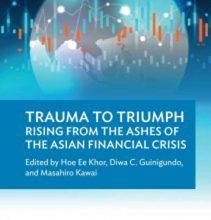Future of work and workers

(Part four of a five-part series)
In the ILO publication entitled The Future of Work in the Philippines, much can be learned about what we have to do to prepare for the time when a larger portion of our workforce will be in occupations that are directly or indirectly related to Industry 4.0. It is important for education, business and government leaders to digest the content of this very valuable document. Realistically, however, in the next 10 years at least, most of the work and occupations that will be available to the majority of our labor force will really be related to the first three industrial revolutions — the mechanical, electrical and electronic revolutions, with minimum interaction with the digital revolution. For example, the millions of farmers, especially in the rice, coconut, and corn sectors, will have to increasingly mechanize their farming operations, learn about optimum practices in fertilization and irrigation and other technologies that have little to do with digitalization. We can say the same thing about the sectors that will absorb the vast majority of the labor force, such as construction, mining, public utilities, transport and logistics, and tourism.
To be fair, the publication readily admits that the timing of the impact of digitalization on the work force of the Philippines is still uncertain. As we can read in the report, “The analysis presented in this report so far contends that digitalization may transform occupations in a way that either disrupts the need for human involvement in jobs, complements human tasks, or both. A key caveat of this analysis is that it does not capture the timing of the digitalization impacts. Whether or not digital transformation is already impacting the jobs market remains in question. To what extent has digitalization transformed the current demand or workers? What does the current picture say about the future direction of skills demand in the country?”
The answer I give is that the focus of skills development in the Philippines for at least the next 10 years should be the improvement of the quality of basic education in the Philippines that is lagging behind most of our East Asian peers, as shown by the poor performance of our pupils in international tests in reading comprehension, mathematics, and science. Next priority should be investing heavily in technical education that will provide the skills necessary in medium-technology manufacturing enterprises such as food and beverage, textile and garments, electronic components, automotive parts, etc. As I have emphasized to no end, there should be a shift among our youth to technical or vocational schools and away from colleges granting academic degrees.
There is no harm, however, in already taking into account what the ILO Report says about workforce and skills development in an era of technological disruptions. Business, the academe, and government should already plan long run to prepare the necessary workforce in response to the new technological wave. For example, it is enlightening to learn from the report what LinkedIn’s 2019 Emerging Jobs Report lists as the fastest growing jobs in the Philippines: robotics engineers, cybersecurity specialists, customer success specialists, data scientists, sales development representatives, full stack engineers, DevOps engineers, data engineers, JavaScript developers, and cloud engineers. The names of these occupations may still sound Greek to the majority of parents and students in the Philippines but there is a small minority of children of the upper income households that already eyeing specialized courses in these fields being offered by the Asian Institute of Management, the University of the Philippines, Ateneo University, or De La Salle University. In fact, my own University of Asia and the Pacific, is attracting a good number of college students to courses related to data analytics.
For the best and the brightest among our millennials and centennials, the information contained in the ILO Report can be very valuable for planning their respective educational and training routes. Especially those already in the BPO-IT industry should take special interest in the findings of the ILO report since many of them who are in the call or contact center portion of the industry may be made obsolete when robots and Artificial Intelligence take over the business of customer service. According to the ILO Report, the fast-growing jobs that require intensive interaction with machines demand a broad range of skills. Future skills demand in knowledge-intensive industries (still the minority in the Philippine economy for the foreseeable future) may be gravitating towards individuals who are versatile, able to multitask, and equipped with multiple intelligences and sharp problem-solving skills. Full stack engineers, for example, manage all technologies required of a project from start to finish, eliminating the need for engineers to manage the segments of the task at hand. DevOps engineers are “hybrid” engineers, managing both technology development and technology operations and mitigating linkage-related problems in business processes.
Other jobs available to the intellectual elite among Filipino workers will require the ability to interact well with people while aided by machines for greater task efficiency. Customer success specialists, for example, do not simply answer specialized queries (as what many call center agents do); they are trained to proactively respond to client needs by working with them along the problem-solving process. Sales development representatives not only sell products to clients but also work on client retention, consulting, and lead generation. These occupations require unique skills. They require a great deal of experimentation, hypothesis testing, creativity, critical thinking, grit, and even failure tolerance. As these emerging occupations become more predominant in a decade or so, it is important to link the jobs-technology debate to the quality of, no longer basic education, but tertiary education. According to the ILO report, 25% of workers in the Philippines have a tertiary education degree, about 40% have a lower-secondary education degree, and another 25% have completed primary education.
Those whose jobs will be most affected by digitalization are those with college degrees. College curricula have to be significantly transformed so that their graduates will acquire the highly important skills of critical thinking, complex reasoning, and effective communication. As Joseph Aoun wrote in his book Robot-Proof: Higher Education in the Age of Artificial Intelligence, most colleges’ curricula and pedagogy still place inordinate weight on the transfer of information into students’ minds. Development of students’ higher-order mental capacities, like critical thinking or elegant communication, are all too often secondary to the ingestion of content. More often than not, college courses are not designed to nurture metacognitive skills explicitly and systematically. It is interesting to note that graduates of American colleges and universities, after which our institutions of higher education are patterned, are generally deficient in these skills. In a 2011 study by professors Richard Arum and Josipa Roksa, it was revealed that 45% of the undergraduates they surveyed showed “exceedingly small or empirically nonexistent” gains in critical thinking, complex reasoning, and written communication during their first two years of college. After four years, 36% of their sample still showed no improvement at all. Another damning piece of evidence about the low quality of university education in the US showed that 30% of Americans aged 34 or younger with bachelor’s degree failed to score above two out of a five-level numeracy assessment. For its assessment of problem solving, this dismal figure rose to 34%. I can imagine what a similar survey of Philippine college graduates would reveal.
To address the skills challenge that the Philippines will face in the next 10 years, there is no question that we must first improve significantly the quality of basic education. Not only will the products of our elementary and secondary schools meet the skills requirements of most of occupations in agriculture, industry, and services in the short run but they will form part of the foundation of the skills development program necessary to meet the challenge of digitalization or Industry 4.0 in the intermediate future. This would require the Government to significantly increase our education budget from the measly 2% of GDP now prevailing to the 4-6% average that our East Asian neighbors are investing in public education. A good portion of that investment in education should be channeled to technical education in the TESDA-type schools that both the private sector and the government should establish in greater numbers.
At the higher education levels, an improvement in quality can be only attained if we consider the “numerus clausus” that even the Chinese are not implementing. We should limit the number of institutes of higher education. Needless to say, all the necessary funding and support should be given to the University of the Philippines system so that it can aspire to be one of the top universities in Asia, at the same level as the universities in Singapore, Hong Kong, Japan, and South Korea. Instead of the Government putting up more state colleges and universities, however, it should put up a large educational fund to enable the brightest among the children of the low-income households to enroll in the best private universities of the country. One measure of the quality of these universities is their ability to turn out knowledge workers with skills in critical thinking, complex reasoning, effective communication, numeracy and problem solving — the skills that will be completely necessary for the economy to be ready for full digitalization that will be required by the Fourth Industrial Revolution that will be upon us as we transition to advanced economy status by 2050.
There is still time to introduce these educational reforms.
(To be continued.)
Bernardo M. Villegas has a Ph.D. in Economics from Harvard, is professor emeritus at the University of Asia and the Pacific, and a visiting professor at the IESE Business School in Barcelona, Spain. He was a member of the 1986 Constitutional Commission.




